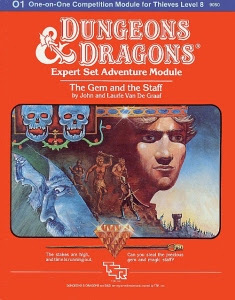Retrospective: The Gem and the Staff
 An aspect of the Little Brown Books of OD&D that's often commented upon is the statement, early on in Volume 1, that a single campaign consists of "from four to fifty players." By contemporary standards, that's quite a large number of players. In truth, it was quite large even in my own youth, though it wasn't at all uncommon to encounter RPG groups of a dozen or more. I can't speak to how common that was, outside of organized game clubs, but I get the impression that, in the first few years of the hobby, there was an expectation that a "typical" adventuring party consisted of six to twelve characters.
An aspect of the Little Brown Books of OD&D that's often commented upon is the statement, early on in Volume 1, that a single campaign consists of "from four to fifty players." By contemporary standards, that's quite a large number of players. In truth, it was quite large even in my own youth, though it wasn't at all uncommon to encounter RPG groups of a dozen or more. I can't speak to how common that was, outside of organized game clubs, but I get the impression that, in the first few years of the hobby, there was an expectation that a "typical" adventuring party consisted of six to twelve characters.At some point, though, that expectation started to change. I can't pinpoint precisely when the shift occurred, but it's clear that it did so. By the 1990s, if not before, I started to notice that gaming groups (and, by extension, adventuring parties) were getting smaller and smaller, with three or four characters being much more typical. I have lots of unsubstantiated theories about why this shift might have occurred. Regardless of the reason, I contend that gaming groups in the second decade of the hobby were smaller than those in the first decade.
Circumstantial evidence in support of my thesis is the fact that, throughout the 1980s, TSR experimented with multiple formats to facilitate the playing of solo and one-on-one Dungeons & Dragons. There were modules like Blizzard Pass and Midnight on Dagger Alley, not to mention the D&D-branded Endless Quest books, which, while not as genuinely game-like as, say, the Fighting Fantasy series, were nevertheless an attempt to present a solo D&D "experience." Another approach was the one adopted by 1984's The Gem and the Staff by John and Laurie Van De Graaf. Written for a single player and a Dungeon Master, module O1 is the only example of this kind of module from TSR. I assume, based on the fact that there were never any similar modules, it was not as well received as the company might have hoped.
Like TSR's previous solo efforts, The Gem and the Staff comes with a pregenerated character, Eric the Bold. Also like TSR's previous efforts, Eric belongs to a class with thief abilities (in this case, being an actual thief). I find it fascinating that every TSR module in this general class of adventures relies on the player character being a thief or thief-like class. I'm certain this is because thief abilities provide an obvious way to handle non-combat actions. Indeed, all these modules are structured in a way that's reminiscent of the 1980 video game, Rogue, which has proven extremely influential in the decades since.
In the case of The Gem and the Staff, the module consists of two distinct scenarios, "Tormaq's Tower" and "The Staff of Fazzlewood." In each, Eric is expected to steal a valuable item in the possession of the wizard Tormaq. To succeed, the player must use stealth and quick wits to overcome not just traps (both mundane and magical) but also monsters and other opponents (such as Tormaq himself). To aid in visualizing the various rooms Eric must navigate, the module includes a map book for players that's somewhat akin to the cardboard dungeon floors I occasionally used as a kid. Also included are little cut-out figures to mark the locations of Eric and his potential opponents. This is a nice little feature in my opinion and it certainly helps both the player and referee to get a good handle on Eric's progress.
As presented, the idea behind The Gem and the Staff is that, after the completion of the first adventure, the player and referee swap places with one another. I'll admit that it's an odd conceit and I have no idea how many people who bought the module ever followed its instructions in this regard. Of course, because of its set-up – a single pregenerated character of 8th level and very limited scopes for the two scenarios – I have to wonder how many people ever made use of it at all. I certainly never did, though I repurposed the player's maps for something else entirely.
I'm not really sure what to make of The Gem and the Staff. The module has its origins in a tournament event from the late 1970s, which may explain its "boxed in" feel, not to mention the slightly "adversarial" nature of its one-on-one presentation. The result is something that's a lot more explicitly "game-y" than many D&D modules, more like a puzzle that needs to be solved than an exercise in roleplaying as I typically understand it. In that respect, my earlier reference to the video game Rogue is not far from the mark, though The Gem and the Staff predates it (in its original form, prior to TSR's publication of it). In the end, I suspect this is simply another failed experiment from a period seemed to be throwing lots of ideas against the wall to see what might stick.
Published on August 02, 2022 21:00
No comments have been added yet.
James Maliszewski's Blog
- James Maliszewski's profile
- 3 followers
James Maliszewski isn't a Goodreads Author
(yet),
but they
do have a blog,
so here are some recent posts imported from
their feed.



